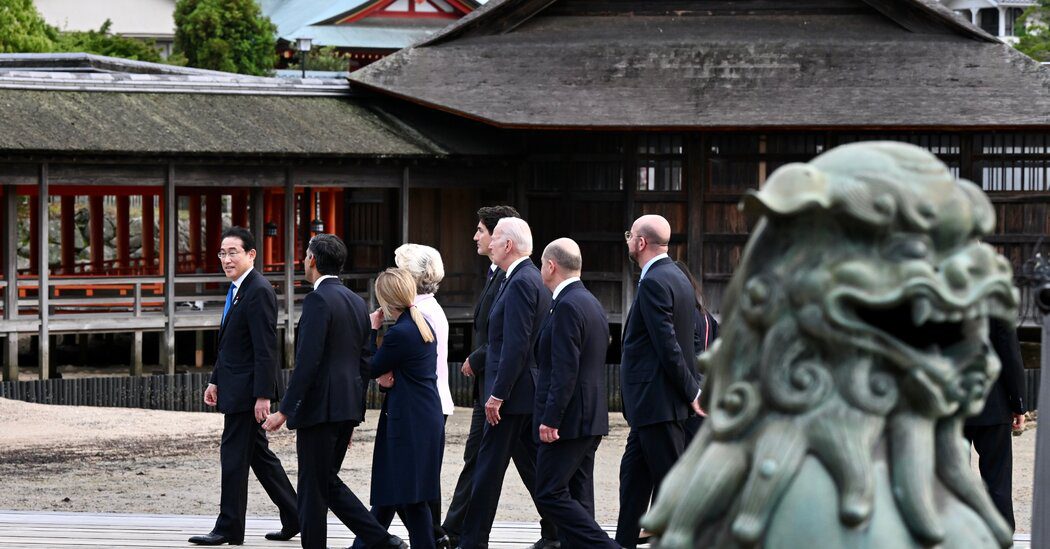Global Courant 2023-05-20 14:52:43
In theory, the world’s major industrialized democracies have agreed to stop using fossil fuels in just over a quarter of a century and switch to new energy sources such as solar and wind as soon as possible.
But as the leaders of the Group of 7 met this weekend in Hiroshima, Japan, for their annual meeting, some countries were arguing over whether or not to loosen commitments to phase out the use of carbon-emitting fuels such as gas and coal in time. to avoid the worst. consequences of global warming.
The summit’s closing communiqué, released on Saturday afternoon, contained Japanese-sought language blessing continued investment in certain types of coal-fired power plants that the Japanese government helps fund. But leaders made only a modest change to the language of last year’s meeting that supported some new investments in natural gas infrastructure. Germany, which pushed for approval in 2022 as it scrambled to replace Russian gas imports in the wake of Ukraine’s invasion, had tried to expand the wording this year.
The behind-the-scenes struggle underlined the political, economic and practical challenges many Group of 7 countries have faced in accelerating a global energy transition with trillions of dollars in government stimulus.
Startled by the invasion of Ukraine, countries in Europe are scrambling to secure natural gas resources to keep the lights on. At the same time, countries like Japan and to some extent even the United States are trying to protect long-term investments in the fossil fuel industry at home or abroad.
The United States and its allies have moved swiftly over the past year to boost investment in wind and solar energy, electric vehicles, technology to promote energy efficiency, and other measures designed to reduce greenhouse gas emissions and slow global temperature rise. At the same time, they have taken what officials call temporary but crucial measures to keep fossil fuels flowing to global markets, both to avert an electricity crisis in Europe and to keep gasoline prices low around the world.
Those efforts include a price cap on Russian oil, which was hailed as a success at this weekend’s meetings. The cap effectively allows Russia to continue to export oil, but at a discount; keeping its crude oil on the market has helped keep global gasoline prices low.
But tensions in the coalition have flared as some countries try to cut off their access to fossil fuels for decades to come. According to three people familiar with the discussions, the German government, concerned about securing enough energy to power its economy, pushed into Hiroshima to relax the language its leaders used last year several months after the start of the Russian war. against Ukraine.
The 2022 communiqué approved government investment in gas, but only in “exceptional circumstances” and as a “temporary response” to free countries from dependence on Russian energy. Any expansion, the statement said, should not derail countries from their commitments to reduce greenhouse gas emissions. The 2023 statement repeated that language and didn’t go much further.
It is necessary to accelerate the phase-out of our dependence on Russian energy, including through energy savings and gas demand reduction, in a manner consistent with our Paris commitments. Paris, “and the global impact of the Russian war on energy supply, gas prices and inflation, and people’s lives, recognizing the primary need to accelerate the clean energy transition.”
Britain and France fought the German effort. The Biden administration has been caught between defending the president’s own ambitious climate change agenda and helping other United States allies seeking to increase their access to fossil fuels.
The sudden promotion of such fuels has alarmed environmentalists who say approving government investment in gas is incompatible with the promise made by nations in Glasgow, Scotland, by 2021 to limit global temperature rise to 1.5 degrees Celsius or 2.7 degrees Fahrenheit. above pre-industrial levels. .
“The G7 must clearly state how they intend to keep the 1.5 degree Celsius limit alive and drive a global shift to clean energy,” said Mary Robinson, a former president of Ireland. “This is a moment. The climate crisis is coming.”
Britain and France claim the immediate energy crisis is over and Europe averted a potential power shortage this winter. Germany has already built its first liquefied natural gas terminal and hopes to build more.
Japan also has an interest in the further development of natural gas. At a meeting of environment ministers from the Group of 7 countries last month in Sapporo, Japan, Japanese representatives urged the group to allow further investment in developing gas fields in Asia, environmentalists said.
A Japanese Foreign Ministry official speaking on condition of anonymity said Japan, which relies on energy imports, needed natural gas for its energy security and also wanted to help other countries use liquefied natural gas as a way to reduce energy consumption. steps of coal.
Kaname Ogawa, director of the electricity infrastructure division of the Ministry of Economy, Trade and Industry, said Japan was generally determined to reduce its dependence on natural gas, but had sought new contracts to import gas as others had expired . Liquefied natural gas accounts for more than a third of Japan’s power generation, and nearly 10 percent of that gas comes from Russia.
Japan already pushed hard at the Sapporo meeting to prevent environment ministers from promising the Group of 7 a firm coal phase-out date. Unlike the other countries in the group, Japan, which gets nearly 30 percent of its energy from coal, refused to sign a 2030 date to reduce that to zero.
“Our electricity structure differs significantly from that in other countries,” said Mr. Ogawa. “We will introduce renewable energy sources and we will use non-fossil fuels as much as possible, but at the same time, to maintain our electricity security, we must continue to use coal.
The government is funding efforts to use ammonia in coal plants to make them more efficient, a technology it has marketed as “clean coal.” Saturday’s communiqué specifically mentioned ammonia, saying such efforts “should be developed and used, if it can be aligned with a 1.5 degree Celsius trajectory, where they will have an impact as effective emissions reduction tools to accelerate decarbonisation in sectors and industries.”
Activists worry that Japan’s timeline for developing its ammonia technology is too long to help with climate goals.
“The new technology may not come in time to meet the 2030 coal phase-out timeline,” said Kimiko Hirata, founder of Climate Integrate, an advocacy group. “It won’t be developed and deployed until after 2030, so this technology is not compatible with the 1.5 degree target.”
That goal will not be attainable if countries continue to develop new sources of fossil fuels, the International Energy Agency said. The atmosphere has already warmed 1.1 degrees above pre-industrial levels and is hurtling toward that planetary boundary.
In an “action plan for a clean energy economy” released on Saturday, the Group of 7 “acknowledged that there are different paths depending on the energy situation, industrial and social structures and geographical conditions of each country.”
A senior US official said the Biden administration was pushing for “no climate backlash” in the language of gas investments. The official, who spoke on condition of anonymity, said government funding for gas infrastructure should only be allowed in “scary circumstances” and still need to be in line with countries’ plans to stop adding greenhouse gases to the world before 2050. atmosphere.
Hikari Hida contributed reporting from Hiroshima, Japan.




